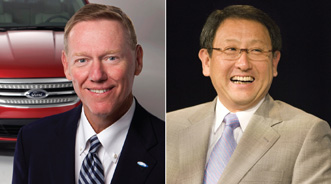Ford & Toyota Partner to Bring New Hybrid Technology to Market Sooner, More

By subscribing, you agree to receive communications from Auto Remarketing and our partners in accordance with our Privacy Policy. We may share your information with select partners and sponsors who may contact you about their products and services. You may unsubscribe at any time.
DEARBORN, Mich. –
Ford and Toyota revealed Monday the two companies will be collaborating on a new rear-wheel drive hybrid system that will offer more fuel-efficient options for consumers in the market for a light truck or SUV.
The two automakers also noted they will be working together to develop "next-generation standards for in-car telematics and Internet-based services."
Regarding the hybrid project, Ford and Toyota have signed a memorandum of understanding on the product development collaboration, with the formal agreement expected by next year.
Toyota president Akio Toyoda expressed his enthusiasm for the new partnership, saying, “Toyota is extremely proud to join Ford in developing a hybrid system for pickup trucks and SUVs.
“Not only is this tie-up clearly one aimed at making automobiles ever better, it should also become an important building block for future mobility in the U.S. By building a global, long-term relationship with Ford, our desire is to be able to continue to provide people in America automobiles that exceed their expectations,” he further stressed.
It was also noted that both companies have already been working on their own separate yet similar rear-wheel drive hybrid systems for years, but now they have decided to work together on the new system in an effort to bring new technologies to “customers sooner and more affordably than either company could have accomplished alone,” management stressed.
Subscribe to Auto Remarketing to stay informed and stay ahead.
By subscribing, you agree to receive communications from Auto Remarketing and our partners in accordance with our Privacy Policy. We may share your information with select partners and sponsors who may contact you about their products and services. You may unsubscribe at any time.
“This new hybrid powertrain will bring the full hybrid experience of greater fuel efficiency to a new group of truck and SUV customers without compromising the capability they require in their vehicles,” officials went on to note.
Offering his take on the upcoming collaborative efforts, Ford group vice president of global product development Derrick Kuzak said, “This agreement brings together the capability of two global leaders in hybrid vehicles and hybrid technology to develop a better solution more quickly and affordably for our customers.
“Ford achieved a breakthrough with the Ford Fusion Hybrid, and we intend to do this again for a new group of truck and SUV buyers, customers we know very well,” he continued.
Takeshi Uchiyamada, Toyota executive vice president of research and development, also expressed his enthusiasm for the partnership, noting the automaker’s past success in the Hybrid market: "In 1997, we launched the first-generation Prius, the world’s first mass-produced gasoline-electric hybrid. Since then, we have sold about 3.3 million hybrid vehicles. We expect to create exciting technologies that benefit society with Ford, and we can do so through the experience the two companies have in hybrid technology."
The Toyota executive also went on to highlight the potential positive environmental impact of the recent agreements.
"Our collaboration with Ford is a move to make hybrid technology more widely available in sport-utility vehicles and in trucks. Those kinds of models are indispensable to American customers. And providing them with our hybrid technology will help conserve energy and reduce output of greenhouse gas here in the United States. That was our thinking in considering the collaboration," Uchiyamada explained.
Highlighting the specifics of the MOU, the two companies noted that though they will be jointly developing the new rear-wheel drive hybrid system and component technology for light trucks and SUVs, they will be independently integrating the new system in their future vehicles separately.
Also, each company will still determine the calibration and performance dynamics characteristics of their respective vehicles.
“By working together, we will be able to serve our customers with the very best affordable, advanced powertrains, delivering even better fuel economy,” said Ford president and chief executive officer Alan Mulally.
“This is the kind of collaborative effort that is required to address the big global challenges of energy independence and environmental sustainability,” he added.
Moving on to further explain the companies’ agreement regarding telematics and Internet-based services, both automakers have agreed to collaborate on future standards and technologies in an effort to increase safety and convenience for consumers.
The telematics collaboration relates only to standards and technologies, and each company will continue to separately develop their own in-vehicle products and features, company officials further stressed.
Kuzak elaborated on the agreement, noting, “Ford has made tremendous progress in the area of telematics. We have unique and very good solutions today with SYNC and MyFordTouch. Working together on in-vehicle standards can only enhance our customers’ experience with their vehicles.”
Toyota’s Uchiyamada added: “Toyota has also invested heavily in telematics in various countries around the world, with services like the G-BOOK and G-Link.
“In the U.S., we have just introduced the accessible, easy-to-use Entune. By sharing our know-how and experience, we would like to offer even better telematics services in the future,” he concluded.


